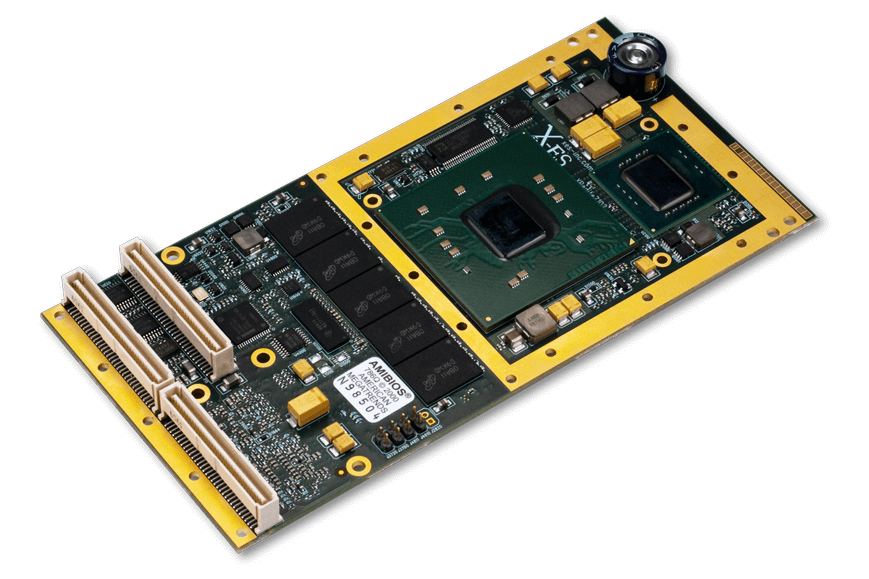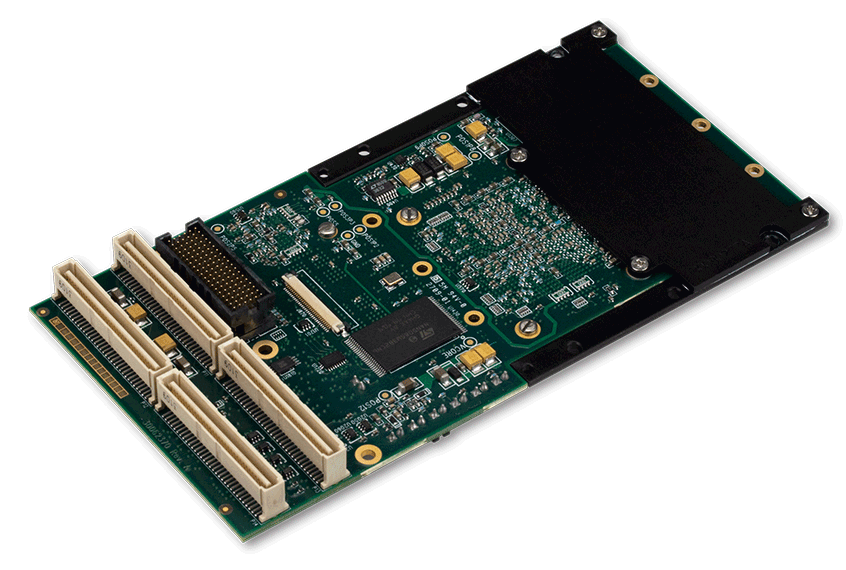Example Derivative Designs
When a standard product does not exactly fit the requirements of an application, X-ES can create a derivative design (also referred to as Modified COTS).
XPedite7102
The XPedite7102 is an Intel® Core™2 Duo-based PMC module that is a derivative of the XPedite7101 XMC/PMC mezzanine module. The XPedite7102 was tailored to meet the needs of a customer and was developed on an extremely aggressive schedule – 9 weeks from initial purchase order to prototype cards.
The XPedite7102 was designed to replace an older, end-of-life PowerPC-based PMC module. The customer needed a drop-in replacement for the older card and wanted to boost performance at the same time. After evaluating the XPedite7101, the customer decided an Intel® Core™2-based PMC would fit their power and performance requirements very well.
An on-site meeting took place to discuss the technical requirements of the XPedite7102 and within three days of the meeting, X-ES had created a specification laying out the I/O, thermal, power, software, and performance requirements for the XPedite7102. The remaining technical details were ironed out via email as the design of the XPedite7102 progressed.
To meet the customer requirements, X-ES made the following modifications to the XPedite7101 to produce the XPedite7102:
- Converted on-card power supplies to run off 3.3 V instead of 5 V
- Added a 2nd Gigabit Ethernet controller
- Removed unneeded functionality, including SATA, XMC connectors, front-panel I/O, and Ethernet magnetics
- Modified the PMC P14 connector with custom I/O, including dual Gigabit Ethernet ports, dual RS-232 serial ports, 8 GPIO pins, and USB
- Added additional mounting holes to accommodate their custom enclosure
- Software modifications to support the above hardware changes
Due to the custom nature of the XPedite7102, X-ES created a test fixture to test its non-standard I/O. X-ES’ XTend3100 dual XMC/PrPMC test & development carrier provided an ideal platform as it already provided the standard power supply rails and PCI connectivity. X-ES created a custom PMC Interface Module (PIM) designed specifically for the XPedite7102 which provided access to the XPedite7102’s serial, Ethernet, GPIO, and USB ports available on P14.
Due to the quick design cycle, prototypes for the XPedite7102 were provided to the customer within 9 weeks of the project start. After prototype verification by X-ES and the customer, production-ready XPedite7102 boards were produced 18 weeks after project start.


XPedite5204
The XPedite5204 is an NXP (formerly Freescale) MPC8548-based conduction-cooled XMC/PMC module based on a previous MPC8548 module, the XPedite5201.
The customer initially evaluated the functionality of the XPedite5201 and was pleased with its performance and thermal characteristics. However, some modifications to the XPedite5201 were required to support the customer’s application requirements.
X-ES discussed the necessary changes with the customer and drafted a specification for the new XPedite5204. The following modifications to the XPedite5201 were needed to accommodate the customer’s requirements:
- Move XMC and PMC connectors to the back of the PCB to improve thermal/mechanical design of their enclosure
- Change XMC PCIe port to a Serial RapidIO port
- Route the MPC8548’s “localbus” (a multiplexed, parallel address/data bus) to P13’s PMC connector instead of the standard 64-bit PCI signals which are normally found on P13
- Design of a test fixture to test the custom P13 localbus pinout
After receiving the initial XPedite5204 purchase order, X-ES shipped prototypes in 10 weeks. During these 10 weeks, X-ES designed and built the XPedite5204 and the test fixture, as well as updated the software to support the unique features of the XPedite5204.
